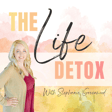
A Wilde Story: PMDD, Cancer, Abuse, and Thriving Through it All
Chelsea Wilde, famous in the PMDD community for her PMDD Memes Instagram page, is an avid snowboarder and passionate singer-songwriter. In this episode, she tells us her story of escaping an abusive marriage, having cancer during the COVID pandemic, and living with Premenstrual Dysphoric Disorder. She’ll tell us what she was most thankful for during her cancer treatment, her tips for living with PMDD, and how her passions helped her through difficult times.
This episode also features Chelsea Wilde’s original music, that you can stream at Chelseawilde.com
For help with PMDD, visit IAPMD Global
The Life Detox is brought to you by Bubble & Bee Organic that offers the world's largest selection of USDA Certified Organic Deodorants, organic facial care, toothpaste, and so much more!

